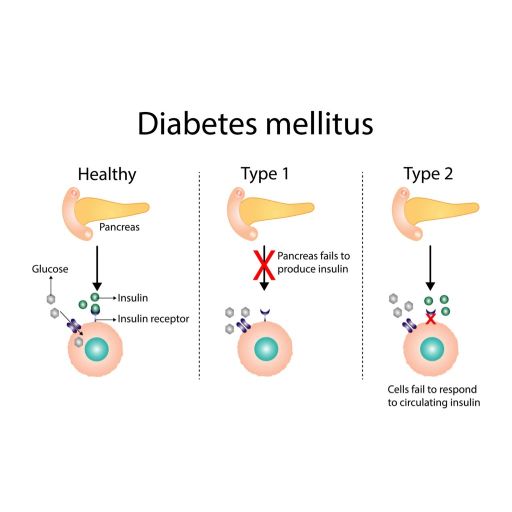Advertisement
Diabetes is a persistent health disorder that affects countless people all over the world. It is characterized by permanently elevated levels of glucose in the blood. Why?—because of the deficiency of insulin in the body or the lack of coordination of the cells with insulin.
Thus, knowing about diabetes is essential for controlling it. Diabetes can affect the body in many ways, which will be explained below.
Types of diabetes
Diabetes comes in three forms: Type 1; Type 2; and gestational.
Type 1 diabetes is the wild one. It is an autoimmune disease where the immune system destroys the body’s own insulin-secreting beta cells within the pancreas. This can be experienced in childhood or in adolescence. However, it can also occur at any age.
Type 2 diabetes is the most common variant. It is usually experienced after the age of 30, but due to the increasing rates of obesity, it is starting to be seen even in children. It occurs either when there is insulin resistance from the body or there isn’t enough insulin produced to bring down blood sugar levels.
Gestational diabetes is a temporary visitor. It occurs during pregnancy and usually clears up after childbirth. However, it can set the stage for type 2 diabetes later in life. So, even after the baby arrives, it’s wise to keep an eye on those blood sugar levels.
What does diabetes do to the body?
Diabetes can shake things up badly in your body. It causes both short-term and long-term issues. Let’s break down how diabetes affects different systems.
Cardiovascular system
Diabetes boosts your chances of heart problems. High blood sugar can harm blood vessels and nerves that help your heart. Here’s what can happen:
●Heart Disease: If you have diabetes, you are twice as likely to face heart disease or stroke. This risk rises when blood sugar, blood pressure, and cholesterol aren’t managed well.
●High Blood Pressure: Diabetes can lead to high blood pressure, making heart issues even more likely.
●Atherosclerosis: Too much glucose can harden your arteries. This makes it harder for blood to flow and can lead to heart attacks.

Nervous system
Diabetes can also cause nerve damage, a condition called diabetic neuropathy. This affects various parts of the body:
●Peripheral Neuropathy: This is the most common form. It impacts the feet and hands. You might feel numbness, tingling, or pain, making it tough to notice injuries or infections.
●Autonomic Neuropathy: This affects functions you can’t control, like digestion and bladder function. It can even mess with your sexual life.
●Cognitive Decline: There’s some evidence that diabetes can lead to cognitive decline and even dementia. High blood sugar over time can harm brain health, leading to memory issues and reduced sharpness.
Kidney
Kidneys are responsible for the filtration of blood. However, this process doesn't work normally if a person is diabetic. The following complications can occur:
●Diabetic nephropathy: This is a serious complication where high blood sugar levels damage the kidney’s filtering system, leading to kidney failure. It is important to identify it in its early stages because it can be controlled.
●Increased risk of kidney disease: Blood sugar is chiefly regarded as the most probable cause of kidney disease. It is possible to avoid or slow down kidney damage if blood glucose is checked.

Eyes
Advertisement
Diabetes can considerably harm the eyes, which might result in vision-related issues:
●Diabetic Retinopathy: High glucose levels can cause blood vessels in the retina to leak or rupture, leading to vision impairment and, in severe cases, blindness. Regular eye checkups are necessary to avoid this complication.
●Cataracts and Glaucoma: Those with diabetes have a higher risk of developing cataracts, a condition where the eye lens is cloudy. It may also lead to glaucoma, a condition in which the eye pressure is higher than normal, which affects normal eye sight.
Feet
Diabetes can really take a toll on foot health. Here’s how:
●Poor circulation: High blood sugar can slow down blood flow to your feet. This makes it tougher for injuries to heal.
●Diabetic foot ulcers: Nerve damage might rob you of feeling in your feet. A tiny cut can go unnoticed. If you ignore it, it could get infected, and that’s where trouble starts. We’re talking serious complications, like amputations.
●Infections: People with diabetes are more prone to infections. Why? Reduced circulation and a less responsive immune system play a big role.
Skin
Diabetes doesn’t just stop at your feet; it can mess with your skin too. Here’s how:
Infections: High blood sugar levels make your skin more vulnerable to infections. Fungal infections, anyone?
Diabetic Dermopathy: This fun-sounding condition causes light brown, scaly patches on the skin, especially on the shins. Not exactly a fashion statement.
Acanthosis Nigricans: Ever seen dark, velvety patches in body folds? That’s acanthosis nigricans, often linked to insulin resistance. It’s a sign that your body is having a bit of trouble.

Teeth and gums
Diabetes can adversely affect oral health.
●Gum Disease: High blood sugar levels can lead to gum infections and periodontal disease, which can result in tooth loss.
●Dry Mouth: Reduced saliva production is common in people with diabetes, leading to dry mouth and an increased risk of cavities and infections.
●Delayed Healing: Diabetes can slow down the healing process after dental procedures or injuries.
Managing diabetes and preventing complications
While diabetes poses many risks to health, effective management can significantly reduce complications. Here are essential strategies:
●Monitor Blood Sugar Levels: Regular monitoring helps maintain blood sugar levels within a target range, reducing the risk of complications.
●Healthy Eating: A balanced diet rich in whole grains, lean proteins, healthy fats, and plenty of fruits and vegetables can help manage blood sugar levels.
●Regular Exercise: Physical activity can improve insulin sensitivity, aid in weight management, and enhance cardiovascular health.
●Medication Management: Following prescribed medication regimens, whether insulin or oral medications, is crucial for blood sugar control.
Diabetes is a tricky condition that touches almost every part of the body. To manage it well, you need to understand how it works. With the right care, people with diabetes can live happy, healthy lives. But staying aware and taking action is the best defense.
Advertisement





